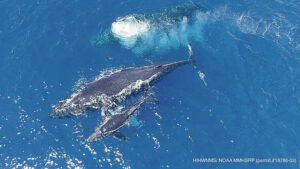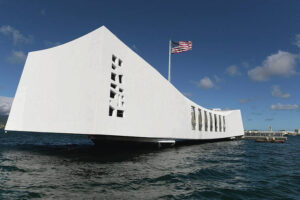If itʻs your first time to the Islands, you may be a little thrown off by all of the local slang. “Shoots,” “slippahs” and “kapu” probably arenʻt in your day-to-day vernacular, and it can all seem like a lot when you first arrive in Hawaiʻi. So donʻt fret, and check out the collection of words and terms weʻve put together that will get you through your trip without anything important being missed in translation.
1. Aloha
Aloha is a funny one since it has so many definitions—it can mean hello and goodbye. Itʻs also what we call the spirit of generosity and giving found here in Hawaiʻi, hence the term “aloha spirit.”
“Aloha!”
2. ʻĀina
The Hawaiian word for land, locals will often refer to the island youʻre on as the “ʻāina.”
“Please pick up your trash to care for our ʻāina.”
3. Aurite
A local way of saying “alright,” residents of Hawaiʻi use aurite as a more excited way of agreeing with something or for confirmation.
“Keoni got some poke? Aurite!”
4. Aunty/Unko
Itʻs not uncommon for kamaʻāina to call men and women older than them “aunty” or “unko”—a local version of uncle that omits the “le” sound. You donʻt have to be blood related at all to be—or call someone—an aunty or unko.
“Hey aunty how are you doing? Is unko Silva still working at Pearl Harbor?”
5. Bumbai
Pidgin phrase that typically means “or else.”
“You better pick up your slippahs bumbai you’ll get scolded.”
6. Braddah (Brah)
An endearing way to call out to a young to middle-aged man.
“Hey brah, you left your wallet at 7-11!”

7. Broke da Mouth
When something you’ve eaten is so good, that your mouth is left in a state of disbelief and can be considered “broken.”
“Aunty Thelma’s banana lumpia was so good brah, broke da mouth.”
8. Chee-hoo
An extremely local expression of excitement or happiness. The longer you can draw out the “chee” and “hoo” phase of the word, the better.
“Rebel Souljahz set was so good! Chee-hoo!”
9. Choke
Plenty, or a lot.
“I went to Costco last Sunday and had choke cars in the parking lot.”
10. Coconut Wireless
Local word-of-mouth is strong, especially in smaller communities. It’s so strong we’ve begun calling it the “coconut wireless.”
“I heard on the coconut wireless that Sabrina just got engage to Rubio. For real, my aunty heard it from her daughter’s best friend’s boyfriend!”
11. Da Kine
A catch-all term to denote literally anything you can’t remember the name of.
“Shoot, you remember where I put da kine? It was right by da kine when I left for da kine.”
12. E Komo Mai
Welcome.
“I heard you just moved here. E komo mai!”
13. Fut
To fart.
“Tati did you just fut? Brah it stinks so bad.”
14. Green Bottles
Specifically used to refer to Heinekens, the preferred beer of quite a few locals in Hawaiʻi.
“We gonna hit the beach this Thursday—Sandy’s of course—with a six pack of green bottles if you wanna come?”
15. Grinds (Grindz)
To eat, it can also refer to food. It can also be spelled with a “z” for unknown reasons.
“I surfed so long yesterday, I was grinding on some ono grindz.”

16. Hale
Home, someone’s house.
“Come over to my hale for some grinds.”
17. Hamajang
When someone or something is very disorganized, not put together or messy.
“Did you see Jaden’s room? So hamajang!”
18. Hana Hou!
A term used to ask for “one more!” Typically will be shouted by a crowd of a music act to encourage the artist to perform an encore.
“Hana hou, hana hou, hana hou!”
19. Hanabata Days
Childhood, when you were a child.
“I loved those red Otter Pops from my hanabata days.”
20. Hapa
Half, usually used to denote that someone is of two ethnicities.
“Didn’t you know Dillyn is hapa? She’s Japanese and Caucasian.”
21. Hawaiian Time
If you’re running late, or just aren’t in a rush to get to something or do something, you’re on Hawaiian time.
“Sorry Kainoa, I’m gonna be a bit late to dinner, I’m on Hawaiian time right now.”
22. Ho
If you’re trying to get someone’s attention, a short “ho” will do the trick.
“Ho! You got the time?”
23. Holo Holo
To take a pleasurable stroll or to wander without a purpose.
“I just went holo holo around Kaimukī and found the coolest little coffee shop.”
24. Howzit
A combination of the words “how” “is” and “it.” Often used to ask someone how it’s going, or how they are doing.
“Ho howzit brah?”
25. Irrahz
If you’re annoyed, or someone is annoyed, they are irrahz.
“I went to the Wahiawa DMV to get my license renewed and the line was so long, brah I was so irrahz.”
26. Junk
A way to describe that something is bad or not up to par.
“Not going to lie, that movie was pretty junk.”

27. Kamaʻāina
Longtime resident or local.
“My great-grandparents came over to Hawaiʻi during the plantation days and our family has been here ever since, so yeah I guess we’re kamaʻāina.”
28. Kanaks (Kanak Attack)
Being put into a food coma.
“I fully had a kanak attack after pounding down that chili loco moco from Zippy’s.”
29. Kapu
A term of warning that something is forbidden or not allowed.
“Kapu, do not enter.”
30. Kāne
Man, men.
“Don’t go into the bathroom marked wahine, Richard. You want the one that says kāne.”
31. Keiki
Kid, kids.
“It was so cute watching all the keiki run around Makiki District Park yesterday for their soccer games.”
32. Kuleana
The Hawaiian word for responsibility, or to take responsibility.
“The beach is our kuleana, and we have to make sure to pick up our trash and the trash of others to keep it clean.”
33. L’dat
A combination of the words “like” and “that.”
“I like it just l’dat.”
34. Lānai
Not to be confuse with Lānaʻi, the island, lānai mean porch, or veranda.
“Let’s go cruise on my lānai and watch the sunset.”
35. Local
Like a kamaʻāina, someone who has lived in Hawaiʻi since birth or for a long—long—time. People who live in Hawaiʻi are referred to as locals, and not Hawaiians—unless they are of Hawaiian descent.
“I never knew Chris was a local until he busted out in the meanest Pidgin.”
36. Mahalo
A way to say thanks, or thank you.
“Mahalo for the malasadas!”
37. Makai
Towards the ocean. Often used in a directional sense.
“Yeah I’m going makai on Ward Street, I’ll be there in ten minutes.”

38. Mauka
Inland, or towards the mountains. Often used in a directional sense.
“Where are you at Ala Moana? Are you at the mauka side bus stop?”
39. ʻOhana
Family.
“ʻOhana means family, and family means nobody gets left behind.
40. ʻŌkole
Hawaiian phrase for butt.
“Seriously pick up your slippahs bumbai you gonna get your ʻōkole whipped!”
41. ʻOno
When food is delicious, it’s ʻono.
“My unko Braden made the best steaks last night, was so ʻono.”
42. ʻŌpala
Garbage, trash.
“Make sure to bring a bag with you on any hike you go on so you can pick up ʻōpala.”
43. Pau Hana
To be done with work, often used to denote happy hour at bars.
“Let’s go hit up the pau hana special at Duke’s and start the weekend off right.”
44. Poke
Cubed raw fish that can be eaten on its own or in a bowl of rice, called a poke bowl.
“Foodland Pūpūkea has the best poke bowl on island, seriously.”
45. Pūpū
Appetizer or appetizers.
“Let’s share a pūpū, I don’t want to fill up to much before the main.”
46. Rajah Dat
Local way of saying “rodger that.”
“You want to go hike Koko Head Crater tomorrow morning? Rajah dat!”
47. Shoots
Another phrase to agree with something, or say yes.
“Jadelynn needs to use my car? Shoots.”

48. Slipphas
Flip flops, sandals.
“Brah who took my slippahs. For real, who took them.”
49. Small Kine
A small amount of something.
“I was small kine annoyed that Tiffany stood me up last night, but it was all good, her pit bull got out and she had to find him.”
50. Stink Eye
A nasty, mean look.
“Brah this guy cut me off on the H2 so I gave him stink eye, but I was behind him so he couldn’t see it …”
51. Talk Story
To talk about anything and everything—it can range from small talk with strangers to catching up with old high school friends.
“I saw Kyle from my class in Roosevelt and we talked story for half-an-hour.”
52. Tanks
Local pronunciation of “thanks.”
“Ho, tanks!”








